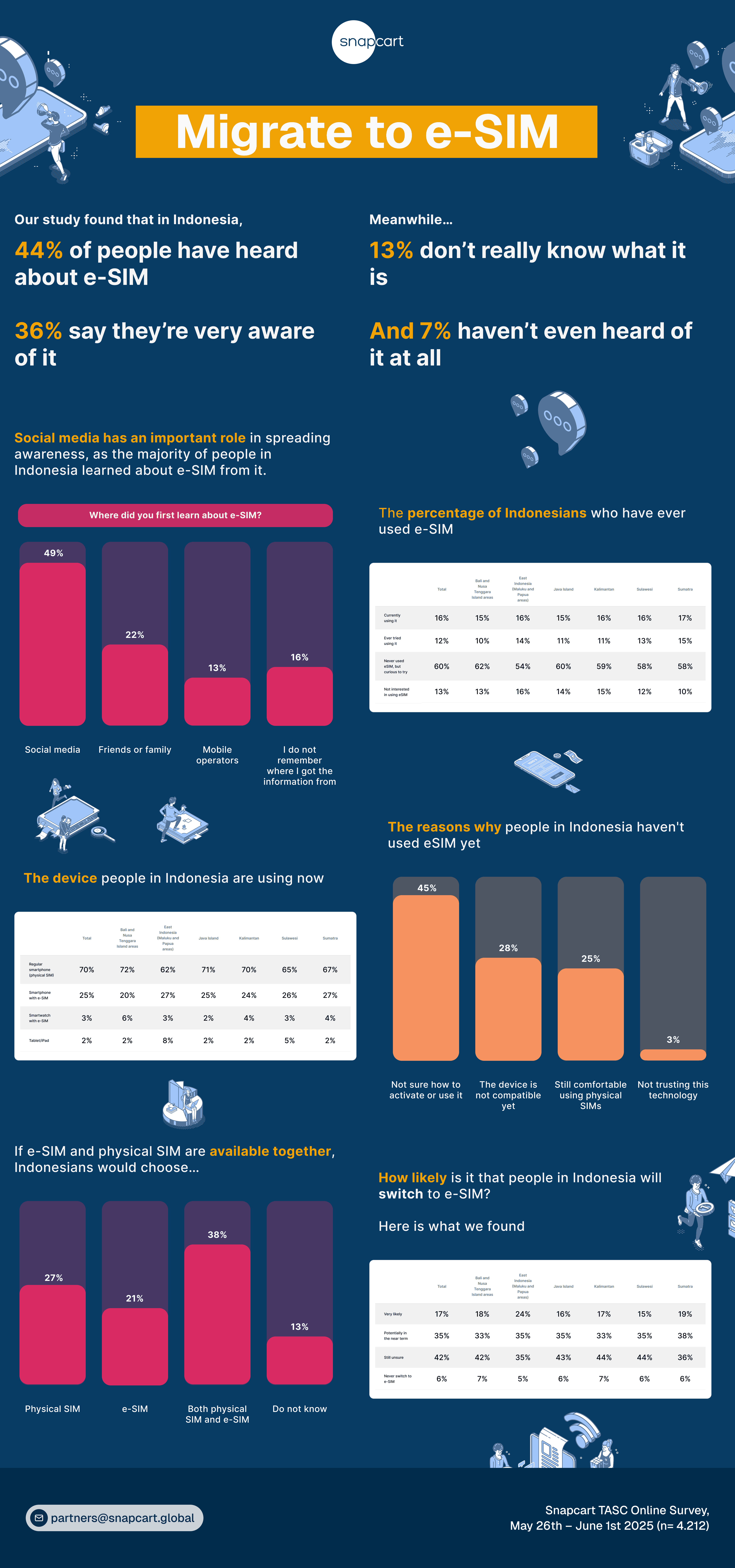In 2025, the Indonesian government has urged the public to migrate from SIM cards to e-SIM for the sake of personal data security and protection against identity theft [1] . But the big question is: are Indonesians ready to embrace this shift?
To answer this question, Snapcart conducted a survey with 4.212 respondents to reveal insightful data about how the Indonesian market perceives and responds to the idea of migrating to eSIM, and here is the result.

Our study found that while awareness of eSIM in Indonesia is gradually rising, it still has room to grow. Around 44% of respondents stated they have heard about eSIM, and 36% said they are very aware of the technology. However, 13% admitted they don’t really know what it is, and another 7% have never heard of it at all. This uneven awareness suggests that while digital conversations about eSIM are increasing, they haven’t reached all layers of the population.
Social media has played a major role in disseminating information about eSIM. Almost half of Indonesians (49%) first learned about eSIM from social media, making it the most influential platform, followed by word-of-mouth through friends and family at 22%, and mobile operators at 13%.
Despite the moderate level of awareness, actual usage of eSIM remains relatively low. The percentage of people who have used eSIM varies across cities, ranging from just 10% in Makassar to 17% in Surabaya. In Greater Jakarta and Bandung, the figure stands at 16%, showing that urban populations are more likely to experiment with the technology. However, the majority of Indonesians, between 58% to 60% depending on location, are still in the “aware but haven’t used yet” category.
Our research found that one of the biggest barriers to eSIM adoption is the lack of clear understanding about how to activate or use the technology. 45% of respondents stated they haven’t switched because they are unsure how to set it up. Another 28% say their current device does not support eSIM, while 25% report that they are still comfortable using their physical SIM cards. Interestingly, only 3% of respondents say they don’t trust the technology itself. These findings reveal that the hesitation is not necessarily due to fear or doubt about security but more about unfamiliarity and a lack of accessible guidance.
Additionally, the devices that Indonesians currently use further explain the slow adoption of eSIM. Most Indonesians still use regular smartphones with physical SIM card slots, with penetration rates ranging from 65% to 71% across various cities. Meanwhile, newer smartphones that support eSIM are less commonly used, although there’s a growing segment that uses dual SIM devices or models compatible with eSIM. As a result, the current device ecosystem in Indonesia still leans heavily towards traditional physical SIMs, which naturally delays the widespread transition to eSIM.
Indonesians’ Interest in Switching to E-Sim
When presented with the option of choosing between physical SIM, eSIM, or both, many Indonesians prefer a combination. This survey showed that 38% of respondents would opt for both physical SIM and eSIM if available, suggesting that consumers are looking for flexibility rather than a complete switch. Meanwhile, 27% would stick with physical SIMs, 21% would choose eSIM only, and 13% were unsure. This hybrid preference highlights the need for transitional solutions where users can explore eSIM without fully letting go of their current habits.
Moreover, when asked about how likely they are to switch to eSIM in the near future, the responses varied across regions. In Greater Jakarta, 24% of respondents say they are very likely to switch, while other regions like Surabaya and Bandung follow closely behind. Across all cities, roughly one-third of people stated they are “possibly” open to switching, showing interest without firm commitment. Meanwhile, around 35% to 44% of respondents across cities said they are still unsure. This reflects a cautious optimism—people are curious, but need more reassurance and convenience before making the leap.
Need to uncover what drives consumers’ decisions? Contact us at partners@snapcart.global.
Source:





